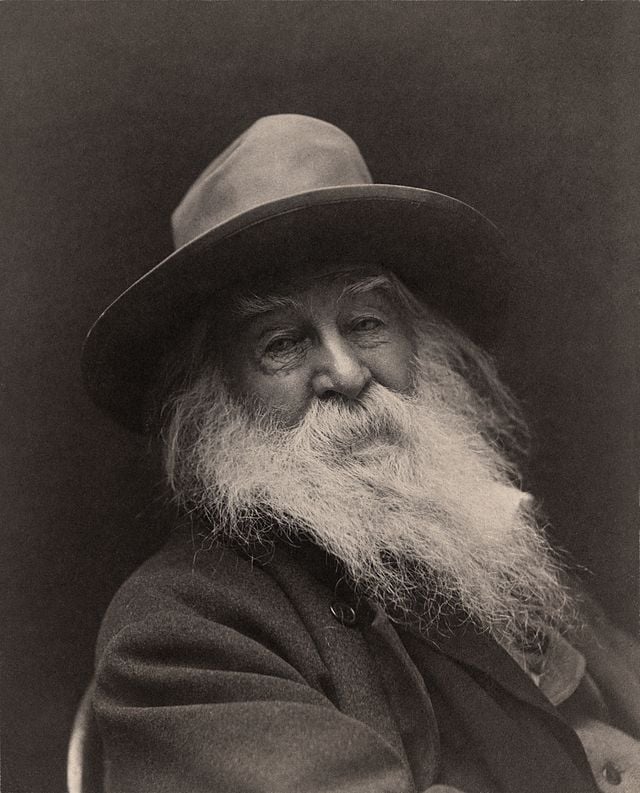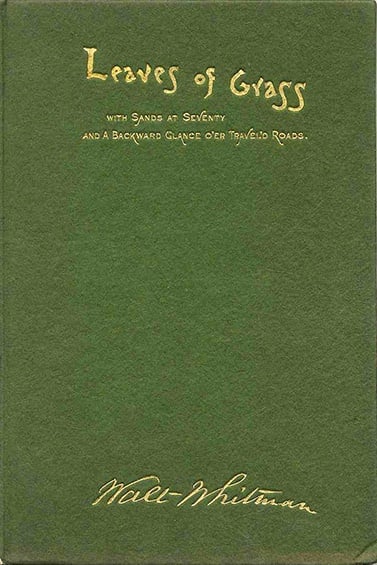Walt Whitman is generally considered, along with Emily Dickinson, to be one of the most important American Poets. His most famous work, Leaves of Grass (1855), which was conceived of as a sort of American epic in the tradition of Homer and Dante, remains one of the most well-known, well-loved, and enduring works of poetry in the canon. Here are nine interesting facts about Whitman and his magnum opus.
1. He Didn't Believe That Shakespeare Wrote His Plays
Questions about Shakespeare authorship have circulated for hundreds of years and will no doubt continue to do so for some time, but that doesn’t make Whitman’s views any less ironic. Despite having left school at age 11 only to go on to become one of the nation’s greatest poets, Whitman didn’t believe that an uneducated Englishman of non-noble birth could have created such estimable plays.
2. 'Leaves of Grass' Doesn't Mean What You Think
While for many the title is so strongly associated with the work that it’s hard to think about the words themselves at all, Leaves of Grass is actually an artifact of Whitman’s self-deprecating word play. 'Leaves' referred to sheets of paper in a book. 'Grass' was used to denote things that weren’t of much value. Thus, Leaves of Grass was intended to mean, more or less, “Pages of Crap.”
3. The First Edition of 'Leaves of Grass' Was Only 12 Poems
Another easy misconception about Whitman’s most enduring work lies in thinking that the thick tome we call Leaves of Grass today was what was released upon the volume’s initial publication. In fact, the first edition (seen here) contained only 12 poems, but its success (due in part to the praise of earlier transcendentalist Ralph Waldo Emerson) led Whitman to continue adding poems to each of many new editions until the final count of his ‘deathbed edition’ reached over 400.
4. Leaves of Grass Also Provoked Quite a Scandal
Because of its frank use of sexual imagery, Whitman’s book was almost abandoned by its publisher. When it was released, many considered it to be obscene, which led, on more than one occasion, to Whitman being denied or fired from the other jobs he worked to support his poetry.5. He Wrote a Temperance Novel
During the temperance movement of the 19th century, it was apparently not uncommon for novels to be printed with explicit themes of temperance as their raison-d'etre. One such novel was forthcoming from Whitman. Franklin Evans (1842) followed the title character’s attempt to give up drinking, and would ultimately be a source of moderate embarrassment for the esteemed poet.6. General Lafayette Picked Him Up and Kissed Him as a Child
Yes, Revolutionary War hero the Marquis de Lafayette was still alive during Walt Whitman’s childhood. One of Whitman’s fondest childhood memories was of a town celebration on his native Long Island in which the famous revolutionary picked him up and kissed him on the cheek.
7. Whitman Was the Basis for Dracula
Unlikely as it may seem, Bram Stoker and Walt Whitman corresponded throughout their lives, and it was in Whitman’s quintessential masculinity that Stoker claims to have found the basis for one of literature’s most iconic monsters.8. He Once Met (and Maybe Kissed) Oscar Wilde
That the Irish wit and playwright visited with the then-infirm Whitman at his house in New Jersey may not be, in itself, terribly remarkable. Following the meeting, however, Oscar Wilde’s remark that "I have the kiss of Walt Whitman still on my lips," helped to further fuel the ongoing discussion around Whitman’s sexuality. Whether he meant it literally or figuratively we may never know.9. President Bill Clinton Was a Big Fan
Scores of writers, politicians, and celebrities have been avowed admirers of Whitman and Leaves of Grass, from Emerson and Henry David Thoreau to Iggy Pop and Allen Ginsberg. What makes Bill Clinton’s fandom notable, however, is that he was so fond of the multitudinous poet that he gifted a copy of Leaves of Grass to Monica Lewinsky just prior to the start of their affair.











